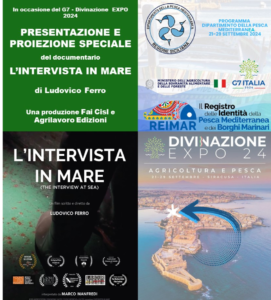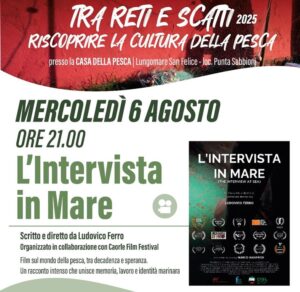The meaning of the pain by the view of the film
As we said in the previous article, the report of the special screening of the film L’intervista in mare at the G7 in Syracuse (article here) could not be considered complete without the story of all the emotions experienced before, during and after the event.
Many months have passed and now we find the courage and the necessary lucidity to tell everything and above all to reflect.
The joy of returning to Ortigia on September 25, after the wonderful days spent in the same place the previous July, has turned into anguish, deep pain and absolute confusion.
It was 10:00 pm and we were having dinner with the delegation of the Sicilian Fai Cisl. We were experiencing a beautiful moment of conviviality, when someone mentioned an accident that had happened on board a lampara the previous night off the coast of San Benedetto del Tronto. The probability that it involved the lampara where we filmed the night of L’intervista in mare was very high. In the entire Adriatic, there are less than ten boats left that practice this type of fishing (based on the encircling of sardines that are attracted by the light of some small boats that are lowered into the water by the main fishing vessel).
A quick search on the internet was enough to find two articles that summarily described, and not without inaccuracies, what had happened (here and here the articles in question). One of the small boats with two sailors on board had sunk and only one of the two then managed to save himself.
Tommaso Fioravanti did not make it and drowned at the age of 60. The shock of reading the name of the fishing vessel, returning in memory to the sailor who is framed several times in our film and who had been informally interviewed in the early hours of the morning two years earlier, made us fall into a state of deep emotional upheaval.

We make a film to denounce the condition of fishermen and the tragedy comes back to us and comes out, in a certain sense, from the film.
During the night before the screening of L’intervista in mare in a context of absolute institutional and therefore media importance, we asked ourselves if it had been right to go there to the sea to observe… to enter into the intimacy of those people… if our operation was nothing more than one of the many forms of profiteering to use the suffering of others for one’s own purposes or in any case not for theirs.
Even just having enjoyed making the film and perhaps the satisfaction of seeing it go around the festivals a bit (as we are telling here) seemed to us, during that sleepless night, like totally wrong things.
In the morning the fear that the tragedy would be used inappropriately to create sensationalism (obviously with the ultimate goal of raising awareness of the working conditions of fishermen) was so present as to make the moment in the limelight almost unbearable.
And instead everything took place with great sobriety and composure, starting with the obligatory minute of silence. Then the film arrived.
The screen, despite the fears, works very well, it is very bright and large, very large. The audio holds up and can be heard clearly even though we were in the middle of the fair. The audience is at least a hundred people and they are all attentive, very attentive and we realize that they are all completely engrossed in the film! In the meantime, they curiously approach the stand and little by little a large audience is formed that follows the film standing!
After the screening, as we said in the previous article, the round table begins and we understand how the film has reached and how it has reached in depth those who have a true and direct connection with the sea, with the profession and with the culture of the sea. We understand that the objective of giving voice to the fishermen has been achieved because they feel that it is their voice, that the character is one of them!
We refer to a Facebook post published by the fishermen of Mazara del Vallo the day after the screening for confirmation of what has just been said.

Then everything started to have a meaning again. What for one night had seemed like a defeat, became a source of new energy and enthusiasm. What we had done could really be useful!
The interview at sea was not an excuse to embark and go on a cruise. We were there to document with the utmost discretion and to show both the very harsh conditions and the cultural value of a job that is disappearing.
All this has nevertheless marked us deeply, and if on the one hand it has given us the energy to continue the festival path, which has become increasingly hectic, on the other it has certainly slowed down and blocked the communication of the many experiences that we have lived and are still living.
Above all, we have felt the need to also tell these deeper, intimate and sociological aspects at the same time, of the journey of The interview at sea. We will still find ourselves taking time and space for different parentheses, and for us necessary, where the communicative need of the news or the report leaves room for reflection.


